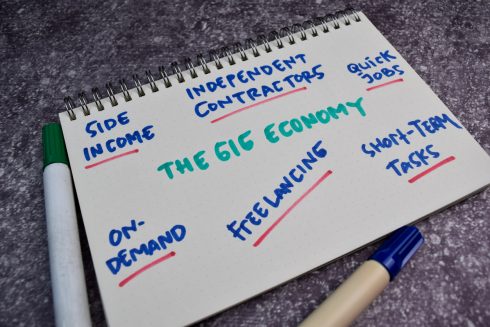Should corporations reward creators' well-meaning community activities with money? Toward the coming era of the Gig Economy
So far, we have introduced the basic concept and case studies of eLife Inc.'s concept of "CSA" (a term coined by combining the initial letters of Creator, Supporter, and Audience). In this issue, CEO Seiichiro Fujiwara will talk about the future of "CSA."
In this marketing column, I have twice explained a concept that we at eLife hold dear: CSA.
Please read our past articles for more details, but in this CSA, the power that drives creators to create is basically a spiritual value. Creators derive spiritual fulfillment from contributing to their favorite brands, expressing themselves freely within them, and being recognized by their supporters for what they express. This will push creators to create even more, and companies, in turn, will gain the benefit of expanding their brand community. This was the basic concept behind CSA.
In this issue, we take it a step further. In addition to the traditional spiritual value, we would like to offer economic value as an ingredient for companies to motivate creators. In short, I would like to propose that it is acceptable to reward them with money or points.
There should be more "small earning places"

Today, mechanisms that stimulate creativity through monetary rewards are not particularly unusual in themselves. For example, YouTube, Instagram, and Note. By sharing their knowledge and creations on these platforms, creators can receive financial rewards. The "gig economy" is a way of working that uses the Internet to take on one-time work on a project-by-project basis without being employed by a company, and the economy that is created by this is called the "gig economy. In a broad sense, there are already many platforms that support the gig economy.
My argument is that if such a way of working and the economy is becoming more prevalent in the world, companies should be more proactive than ever in providing opportunities for it, not just third-party platforms such as YouTube.
Those with extremely high-quality content should continue to present their work on existing platforms such as YouTube and Notebook and earn rewards as they have in the past. However, the hurdle to presenting one's work on such platforms and earning rewards is still high, and at present, not everyone can do it. On the other hand, there must be a significant number of people who have content that is very attractive to others in a certain field, even though it is not of the quality to be presented as a work on such platforms.
There is a certain social significance in providing a place where these people can present their work, connect with those who are looking for that information, and earn some compensation, if not the level of the top players, on a third-party platform. In addition, providing such a place for companies to operate will ultimately benefit the companies that operate them. Simply put, the compensation paid to creators on a company-operated platform is far less than the advertising fees paid to a third-party platform. Nevertheless, in some cases, a greater advertising impact may be expected.
If this is the case, it still makes sense for companies to return a portion of the economic profit they make by doing so to creators as compensation.
Win-win-win relationship as seen in the "MUJI House"

Let me give you a concrete example. One of the examples we are involved in is an initiative with Ryohin Keikaku.
Did you know that Ryohin Keikaku, which offers an extensive product lineup, sells detached houses under the name "MUJI Houses"? Like many housebuilders, they have model houses, where, of course, there are salespeople in their line of work. However, salespeople's sales talk tends to be taken as just that, sales talk. It may be difficult for those who are considering purchasing a house to fully understand the appeal of the house and develop their own image of it just by looking at the model house and listening to the salesperson's explanation.
MUJI had been planning to address this issue by organizing tours of owner-occupied homes where people actually live, but we had a sense that we needed to make it more personal and understandable to people who were considering the purchase of a house. Then, the problem of the spread of the new coronavirus infection was compounded, and the tours themselves became impossible.
This is why we proposed the idea of owner-led online tours, where the owners themselves would live-stream the tours from their homes. The people who can understand and convey the value of a MUJI house better than anyone else are the owners themselves, who have actually purchased the house and live there. We thought that through them, we would be able to convey not only the value and charm of the house but also any minor complaints in a positive manner. We asked the owners to invite their friends to their own homes for previews and asked them to talk about the layout of the house, their daily living style, and any problems they had when designing the house. In addition, we accepted questions in real time on LIVE, and the owners themselves answered the questions of many people who were considering the house, thus creating an interactive communication experience.
Through this project, prospective buyers were able to obtain real opinions that they could more easily personalize. On the other hand, the owners who cooperated in the tours also gained the economic value of rewards in addition to the emotional satisfaction of having helped the MUJI brand and the prospective buyers. Furthermore, MUJI also gained a new sales tool by utilizing the owners as its own sales partners. We believe that we have truly established a win-win-win relationship.
This approach could be applied to various types of businesses. For example, how about a department store that is struggling to attract customers due to the Corona disaster, inviting enthusiasts who are "unbeatable in this" or "have something to say" about some niche product area, and providing a place on the Web to transmit information and exchange opinions?
If contributors are paid a monetary reward (or equivalent points) based on the page views of the content they post, it may be possible to create a place where unique content can be gathered while maintaining a certain unified direction, different from YouTube or Notebooks. It may be possible to create a place where unique content can be gathered while maintaining a certain unified direction.
In addition to goods and services, providing a "place" is valuable

As with the relationship between professional salespeople and homeowners in the "MUJI House" example introduced earlier, it seems to be a major trend in the world these days that the difference between professionals and amateurs is disappearing, or that the line between professionals and amateurs itself is losing its meaning.
For example, today's crowdfunding crowds are lined with many products that are more attractive than those made by major manufacturers. And that's not surprising. There is no way that an idea conceived by a limited number of people within a company, however professional, and bound by the constraints of feasibility, can compete with an idea conceived by a bunch of "amateurs" from all over the world, with no restrictions whatsoever. Of course, no matter how excellent an idea may be, it will be a "cake made out of a picture" without the funds to give it shape, or the manufacturing, mass production, and distribution systems to make it happen. Today, however, all of these necessary functions are being provided in advance by the platform side. In this respect, too, "professional" companies are being forced to fight an uphill battle.
Companies are now faced with the need to create opportunities for co-creation and open innovation as a mechanism to bring together the excellent ideas that currently gather on third-party platforms to their own companies (in such cases, the manufacturing, mass production, and distribution systems that Japanese companies have honed over their long history should be their strength). (In this case, we believe that the manufacturing, mass production, and distribution systems that Japanese companies have honed over their long history should live up to their strengths.)
In other words, in addition to the traditional business of making and selling goods and services, we are now in a situation where companies should count the provision of a "place" that meets the needs of the times as one of the values they offer to the world. In this context, I think it is highly significant for companies to provide new platforms that contribute to the gig economy.
If the current gig economy, supported by existing third-party platforms, is only open to a few outstanding creators, then I think it would be a good idea for more companies to take on the role of expanding that gateway.



